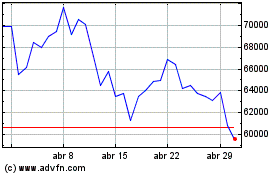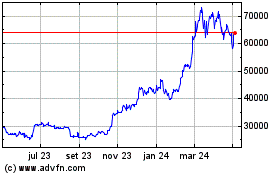Research Firm Predicts Bitcoin Game Theory In Global Adoption Race
30 Julho 2024 - 1:30PM
NEWSBTC
In an analysis released on Monday, ASXN, an emerging crypto
research firm, outlines the dynamics of global Bitcoin adoption
through the lens of game theory. The report titled “The Game Theory
of Bitcoin Adoption Among Nations” provides an examination of how
nations can leverage mathematical game theory to strategically
adopt Bitcoin. The report follows on the heels of Donald Trump’s
announcement at the Bitcoin 2024 conference that he’ll convert all
BTC’s owned by the US government through enforcement actions into a
“strategic Bitcoin stockpile”. Bitcoin Game Theory Explained The
report begins by framing BTC adoption within the broader context of
game theory, a discipline that evaluates the strategic decisions
made by individuals or entities under conditions of uncertainty and
competing interests. According to ASXN, “Game theory provides a
structured framework to predict the outcomes of nation-level
strategies in adopting digital currencies, taking into account not
only the economic benefits and technological advancements but also
the potential geopolitical shifts.” Related Reading: Minimal
Bitcoin On-Chain Resistance Ahead: Price Set For New ATH? According
to the concept of ‘First Mover Advantage’, early adoption of BTC
can position nations advantageously on several fronts. The report
states, “Nations acting as first movers in the Bitcoin arena may
set precedents in legal and regulatory frameworks, attract global
crypto enterprises, and secure a significant share of the
blockchain innovation landscape.” However, it contrasts these
advantages with the pitfalls of premature regulatory frameworks and
the volatility of Bitcoin’s market value, which could pose
substantial risks to national economies. The report adds, “Once a
few influential nations adopt Bitcoin, others will follow suit to
avoid being left behind – creating a bandwagon effect. This effect
is driven by both the returns to adoption as well as the risks of
non adoption. This is when the Bitcoin adoption cycle enters the
steepest part of the s-curve.” The ‘Payoff Matrix’—a fundamental
tool in game theory—is applied by ASXN to dissect the
decision-making process of countries considering Bitcoin adoption
for nations. ASXN elaborates on how this matrix helps countries
assess the potential returns and risks associated with various
strategic choices. “Each nation faces a unique matrix based on its
economic structure, political climate, and market dynamics. The
optimal strategy, while generally skewing towards adoption due to
the projected global ascendancy of cryptocurrencies, must still be
tailored to individual national circumstances,” the report
elaborates. Furthermore, the report also introduces the concept of
the ‘Best Reaction Function’ in the context of Bitcoin adoption,
explaining how nations develop strategies by anticipating the
decisions of others. “A nation’s strategy is influenced not only by
its direct gains from adopting Bitcoin but also by the expected
actions of other nations, which might alter the global economic and
technological landscape,” the report states. Related Reading:
Bitcoin Bull Cycle Likely To Go On Till Mid-2025: CryptoQuant CEO
The researchers add how the bandwagon effect could play out; “The
logic plays out something like – Nation 1 assesses the cost benefit
trade off and decides on adoption. Nation 1 realizes that all other
nations are also going to choose adoption, Nation 1 concluded that,
given that all nations will choose adoption, they should increase
adoption speed so as not to lose competitive edge. Slowly, then all
at once.” ASXN uses several real-world applications to illustrate
the theoretical concepts discussed. The case of El Salvador is
examined in depth, showcasing how its early adoption has influenced
other nations’ perceptions and strategies towards Bitcoin. The
analysis extends to how Wisconsin’s pension fund investment in
Bitcoin ETFs reflects a broader trend of sub-national entities
assessing cryptocurrency as a viable component of their financial
strategies, and the substantial commitment by MicroStrategy is
highlighted as a corporate parallel to national strategies. Looking
forward, the report discusses the potential future trajectories of
Bitcoin adoption, influenced by both technological advancements and
evolving geopolitical dynamics. It specifically addresses Robert
Kennedy Jr.’s proposal at Bitcoin Nashville 2024 to acquire 550 BTC
daily until the US amasses 4 million BTC, which represents 19% of
the total available BTC supply. This approach aims to reflect the
proportion of global gold reserves that the US currently maintains
in comparison to other countries. And the Bitcoin game theory is
already playing out. “Whilst the ideas Trump presented at
Bitcoin Nashville may or may not happen, the simple fact he
publicly acknowledged Bitcoin & it’s properties is a win &
we are already seeing early signs of the effects of this,” the
researchers conclude. They refer to Johnny Ng, a member of Hong
Kong’s Legislative Council, who has been advocating for the
incorporation of Bitcoin into the city’s financial reserves
following Trump’s announcement. At press time, BTC traded at
$66,660. Featured image created with DALL·E, chart from
TradingView.com
Bitcoin (COIN:BTCUSD)
Gráfico Histórico do Ativo
De Jun 2024 até Jul 2024

Bitcoin (COIN:BTCUSD)
Gráfico Histórico do Ativo
De Jul 2023 até Jul 2024
